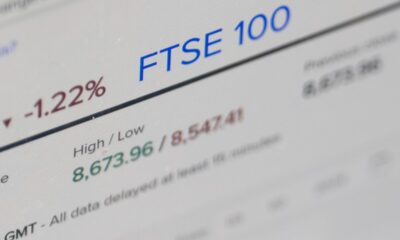Business
How to Achieve £5,000 Passive Income from FTSE 250 Investments

Investors aiming for a passive income of £5,000 from the FTSE 250 index face a significant financial commitment. The index, known for its growth potential, also features numerous dividend-paying stocks, with over 60 currently yielding 5% or more. While not every stock will perform well, there are opportunities to uncover valuable investments that could contribute to substantial income streams.
Understanding Investment Requirements
The average yield across the FTSE 250 currently stands at **3.4%**, which is slightly above the **FTSE 100**. To generate a passive income of £5,000 through index funds, an investor would need to invest approximately **£147,059**. However, those willing to engage in stock picking may find that the capital required could be significantly lower.
A noteworthy example is **NextEnergy Solar** (LSE:NESF), which boasts the highest yield in the index at an impressive **12.7%**. With this yield rate, an investment of just **£39,370** would suffice to achieve the desired annual income of £5,000. Though this amount remains substantial, it is considerably more accessible than the nearly £150,000 needed for the broader index.
Evaluating Dividend Sustainability
NextEnergy Solar operates a diverse portfolio of solar farms, primarily in the UK, generating clean electricity sold to the energy grid. This model creates a recurring revenue stream that adjusts with inflation, allowing for consistent income. The company has a strong track record, having increased its dividend for ten consecutive years, with the current payout set at **8.43p** per share.
Despite these positive indicators, potential investors must acknowledge the inherent risks associated with high-yield investments. For instance, solar farms depend heavily on weather conditions, which can lead to variable energy production. In the first half of **2025**, favorable weather has allowed NextEnergy to exceed its energy generation targets, but this is not guaranteed.
The management’s careful approach to capital allocation has thus far ensured dividend sustainability. However, investor sentiment towards renewable energy stocks remains cautious in 2025. NextEnergy Solar has a **48.5%** gearing ratio, indicating a significant debt burden, which could complicate its financial stability in a rising interest rate environment.
As energy prices are projected to decline in the long term, the company may need to reconsider its dividend strategy to meet financial obligations, raising concerns about the safety of its substantial yield. Therefore, while NextEnergy Solar presents an attractive opportunity, investors should proceed with caution and consider diversifying their portfolios.
In summary, while the FTSE 250 offers avenues for generating passive income, careful analysis and risk assessment are crucial. Investors should weigh potential gains against the uncertainties that high-yield stocks can present, particularly in a fluctuating economic landscape.
-

 Entertainment2 months ago
Entertainment2 months agoAnn Ming Reflects on ITV’s ‘I Fought the Law’ Drama
-

 Entertainment3 months ago
Entertainment3 months agoKate Garraway Sells £2 Million Home Amid Financial Struggles
-

 Health2 months ago
Health2 months agoKatie Price Faces New Health Concerns After Cancer Symptoms Resurface
-

 Entertainment2 months ago
Entertainment2 months agoCoronation Street’s Carl Webster Faces Trouble with New Affairs
-

 Entertainment2 months ago
Entertainment2 months agoWhere is Tinder Swindler Simon Leviev? Latest Updates Revealed
-

 Entertainment3 months ago
Entertainment3 months agoKim Cattrall Posts Cryptic Message After HBO’s Sequel Cancellation
-

 Entertainment2 months ago
Entertainment2 months agoOlivia Attwood Opens Up About Fallout with Former Best Friend
-

 Entertainment2 months ago
Entertainment2 months agoMasterChef Faces Turmoil as Tom Kerridge Withdraws from Hosting Role
-

 Entertainment3 months ago
Entertainment3 months agoMarkiplier Addresses AI Controversy During Livestream Response
-

 Entertainment4 months ago
Entertainment4 months agoSpeculation Surrounds Home and Away as Cast Departures Mount
-

 World2 months ago
World2 months agoCole Palmer’s Mysterious Message to Kobbie Mainoo Sparks Speculation
-

 Entertainment2 months ago
Entertainment2 months agoITV’s I Fought the Law: Unraveling the True Story Behind the Drama





















